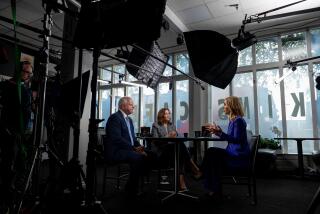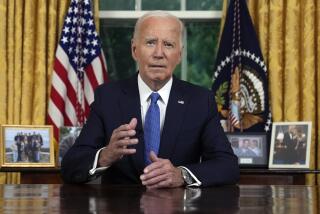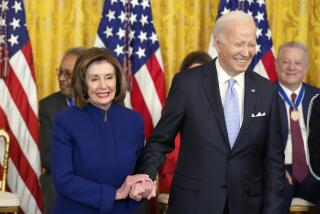Waits for Clarification of ’88 Political Picture : Bush Avoids Talking About His Future
- Share via
WASHINGTON — Vice President George Bush preceded President Reagan on Sunday in taking the oath of office for a second term, but he avoided opportunities to declare his availability for the White House after Reagan leaves office.
In a televised interview taped shortly before he and Reagan were officially sworn in at a White House ceremony, both Bush and his wife, Barbara, seemed determined to keep all options open until the 1988 political picture is clarified.
Bush indicated that he expects during the second Reagan term to be as firm a public supporter of the President’s policies as he was during the first, and he denied any intention to make himself any more visible to the public during the next four years.
Supports the President
“I want to support the President, support our policies--I have a hand in formulating them and shaping them,” Bush said during the interview on the CBS television program “Face the Nation.” And, he added, “If that means forgoing a fast ‘Hey, Mom, I’m on TV,’ I’ll forgo it from time to time.”
Bush rejected a suggestion that his image as a candidate would be tarnished in 1988 if he remains consistently supportive of Reagan. The image would be hurt, he said, “if I tried to say, ‘These are the good things, but I secretly told the President that he shouldn’t do this or that.’ ”
When Barbara Bush was asked on the same program whether she thought her husband should try for the top spot in 1988, she replied that “timing is everything, and I think it’s way too soon to think about that.”
“It will make a difference,” she said, “how the Administration’s doing . . . . If George does a good job and the President does a good job and the timing’s right and he should do it, he’ll do it, and I’ll be there. If not, I’ll be very happy doing whatever he’s doing.”
As has generally been his practice, Bush defended Reagan’s performance on issues that were raised for discussion. When asked about proposals that the federal budget deficit should be reduced by paring the Pentagon budget, Bush said that has already been done.
Bush refused to speculate on what will happen if Congress rejects Reagan’s urgings that it approve funds for the MX missile. But a unilateral decision to scrap a weapon required for modernization of the U.S. arsenal would hurt arms control negotiations with the Soviet Union, he said.
Bush also defended Reagan’s comment last week that some black leaders are stirring up complaints to protect their positions. Some leaders, Bush said, “have an old agenda and have old answers to solving very difficult problems, and we are not going to go down that road.”
Hostages in Iran
Bush, who was questioned on the fourth anniversary of the release of 52 Americans held hostage in Iran, said in reply to a question that the Administration is “doing an awful lot behind the scenes” to bring about the release of five Americans now held captive by terrorists in Beirut.
He conceded that he did not in fact know “factually, definitively” whether they are still alive, but said, “We think they are alive.” In dealing with the kind of “wanton, random terror” displayed in these cases, he said, “it’s very hard to even know who is responsible.”
The missing Americans are the Rev. Lawerence Martin Jenco of Joliet, Ill., kidnaped Jan. 8; Jeremy Levin, who failed on March 7, 1984, to show up for work as chief of the Cable News Network’s Beirut bureau; William Buckley, a U.S. Embassy political officer kidnaped March 16, 1984; the Rev. Benjamin Weir, kidnaped May 8, 1984, and Peter Kilburn, a librarian at the University of Beirut, reported missing Dec. 3.
More to Read
Get the L.A. Times Politics newsletter
Deeply reported insights into legislation, politics and policy from Sacramento, Washington and beyond. In your inbox twice per week.
You may occasionally receive promotional content from the Los Angeles Times.










